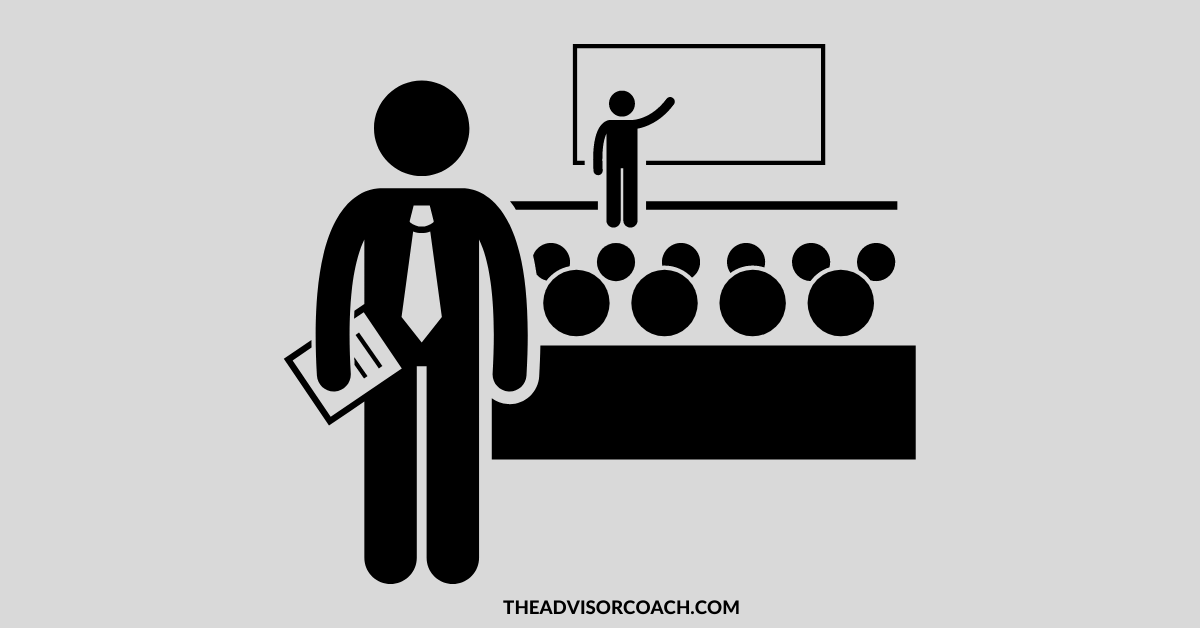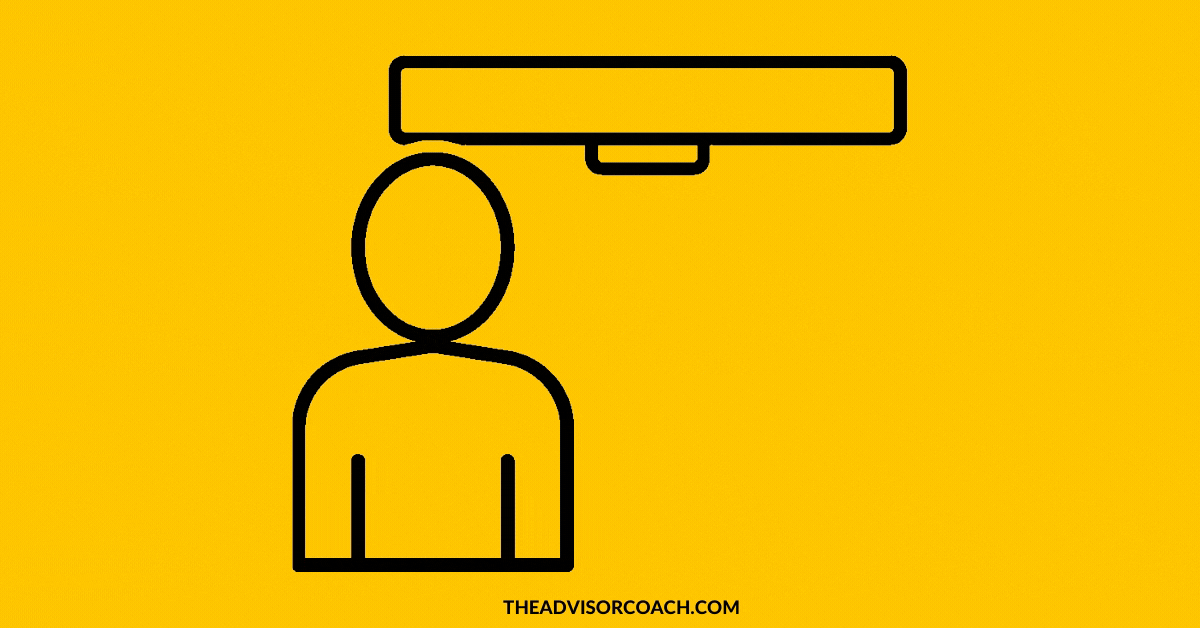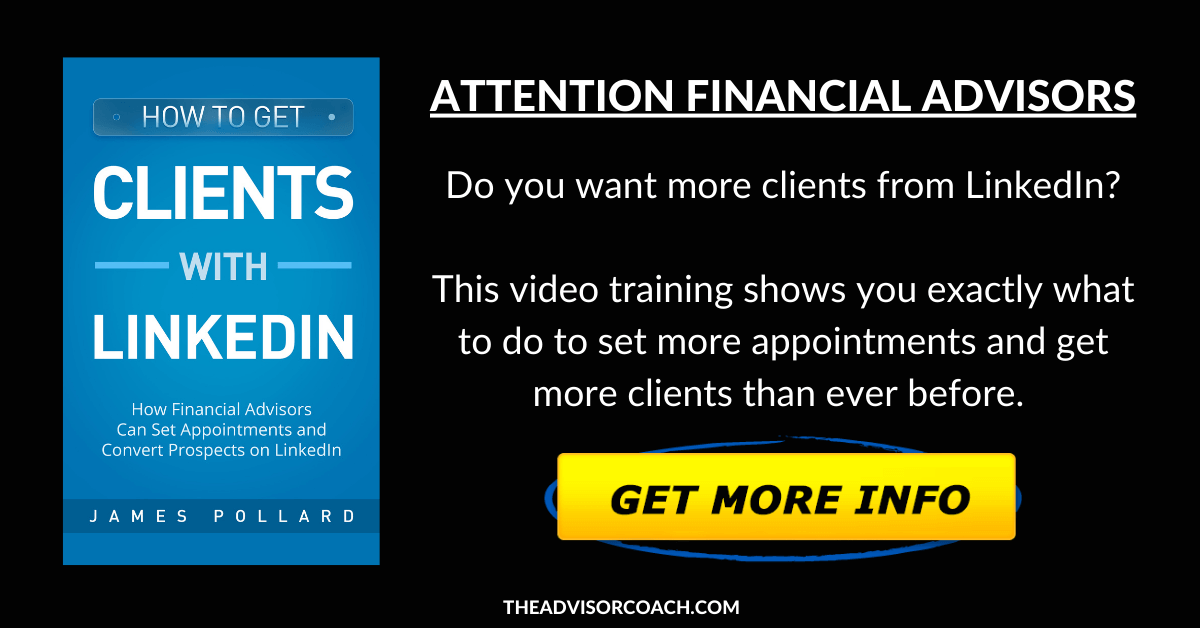10 Actionable Seminar Marketing Tips For Financial Advisors (That Actually Work)Seminars and workshops are proven ways for financial advisors to get new clients. However, marketing them often poses a challenge for advisors.
As a financial advisor, how can you stand out in the seminar field and generate a return on your investment? Check out these tips. Note: Seminar marketing often requires a little money. If you have no money to invest in marketing your seminars, check out The Ultimate Financial Advisor’s Guide to Getting More Clients. It’s filled with free or low-cost ideas to build your business. Likewise, if you are a fee-based advisor, the cost of seminars is difficult to justify. 1. Be In It For The Long Haul.Yes, you can double and triple (or more) your investment in seminar marketing, but it’s done over time. This all starts with knowing your numbers – if your average client is worth $2,000 to you and you convert 5% of seminar attendees, you can spend up to $100 per attendee. Of course, the name of the game is to get a client for as little as possible and make as much as possible.
If your clients stay with you for years, you will make your money back and much more, so do not be afraid to wisely invest your money. The majority of advisors who give seminars don’t get the immediate gratification they crave and quit. If you are disciplined about following up with your leads and maintaining a consistent seminar schedule, you will win. This is the best financial advisor seminar marketing tip I give you. If you're not persistent enough to see it through until it starts working, you won't succeed. So if you're only going to try seminar marketing once or twice, don't bother. You have to stick with it so you can continue to optimize, get your cost down, build trust, etc. All of it gets better as time goes on. 2. Get People To Show Up.In order for seminars to work, people need to show up. Here’s how to get people to show up to a seminar:
I have found that restaurants are the best place to host seminars as long as they match the class of prospects you’re attempting to attract to your event. You should find a restaurant with a private banquet room… with a door (yes, that’s important, believe me). Pick a basic steak, chicken, and vegetarian entree and try to negotiate with the restaurant regarding carryovers for no-shows. 3. Make Education Your Priority.When financial advisors tell me seminars don't work, my first thought is, "Well, what IS working for you??"
Because unless you're a terrible presenter or terrified of public speaking, seminars should serve you well. Think about what a seminar really is - it's a period of time where you can have a few double people in front of you and have their UNDIVIDED ATTENTION for an hour or more. Sometimes advisors will tell me "people with money don't go to seminars". Years ago, I may have agreed with that statement. However, times have changed. Study after study (as well as my own experience) shows that today's investors want to be educated. They want to know WHY their advisor does A instead of B. Are there some people out there who don't want the education? Sure, but I'd rather be able to offer education and have someone not want it instead of having someone want it and not be able to offer it. The beauty of a seminar is that it lets you provide the education people desperately want and "sell" them on you at the same time. I’m not naïve; I know that most seminars already claim that they’re “educational”, but this isn’t really true. They’re self-serving, nonstop-pitching, “I’m-a-big-shot” type deals. In order to succeed with seminar marketing, you need to truly educate people. While the details vary by topic, you do this by giving them the framework they need to make decisions and clearly show them the trade-offs involved in those decisions. When your attendees sense any type of sales agenda, they will get turned off. Sure, you might convert a few leads, but if you come from a place of teaching, you will convert much more. Success comes from educating your audience with information that benefits them… without trying to sell anything. Note: Sometimes seminars can attract people who are there strictly for information. Most prudent investors (who make great clients) typically have such a low interest in financial products that they don’t attend in the first place. Prudent investors are the ones who are conservative, low-maintenance, are relationship-oriented, and are happy to pay for your advice and service. ALSO READ: 8 Things Nobody Tells You About Being a Financial Advisor 4. Make It Relevant To Your Target Audience.The go-to subject for a lot of financial advisors is Social Security. I totally agree with this because it intrigues a broad-range of seniors and the marketing darn-near handles itself. All you have to do is get your direct mail piece into every 55 and older community in your area. I literally tell you exactly how to do this in The Ultimate Financial Advisor’s Guide to Getting More Clients.
While you should make your presentation specific, you need to figure out if a small, intimate setting is even worth your time. You might be able to send out a few thousand direct mail pieces to seniors, but if you’re marketing specifically to physicians, your market may only allow ten or so to show up. This goes back to knowing your numbers. If you know you can convert at a higher percentage with a smaller group, go for it! ALSO READ: 5 Best Niches for Financial Advisors 5. Invite Other Speakers.One of the best strategies for marketing seminars is to invite other speakers. Prime candidates include CPAs and estate attorneys. Ideally, you will be trying to build relationships with these strategic alliances, and inviting them to speak to a group of prospects will only strengthen that relationship.
Another benefit of having multiple speakers is that it legitimizes an event and makes it more comprehensive. It shows attendees that you have access to critical resources they may need. I know that I personally would feel much more comfortable knowing that an advisor can lead me to a “total solution” within his/her own network. Finally, the other speakers may be willing to share the cost of the event, lowering your expenses and your client acquisition cost. Note: This is a double-edged sword. If you invite other speakers, I can almost promise you that your conversion rate will suffer. A seminar should only be an hour or two, and that’s hardly enough time for one person to bond with an audience, let alone two or three. However, if your overall attendance goes up, it might not matter to you. Test, test, test! Oh, and if someone is introducing you, consider writing a few talking points on an index card and giving it to him or her. You want to control as much of your presentation as possible. Don't leave your introduction to chance. Plus, I've found that most people appreciate a few talking points, especially if they don't know you that well. 6. Test Everything.I can’t stress this tip enough. It’s extremely unlikely that you’ll hit it out of the park on your first (or fourth) seminar. The only way that you can improve and systematize is to test what you’re doing. Some variables you could test include:
7. Always Use An Evaluation Form.An evaluation form from a seminar is priceless. It gives you the opportunity to improve. Here are some basics to cover on your evaluation form:
Another great use of the evaluation form is to ask about a prospect’s primary area of interests – IRAs, 401Ks, retirement, tax reduction, etc. – and offering a free consultation to discuss how you can help. Note: You can also have your assistant work the audience, getting to know people and politely soliciting complimentary appointments. 8. Interactivity Is Key.Create a comfortable environment for people to interact with you and ask questions. Again, a non-sales environment is crucial because it makes prospects more comfortable with you. It’s all about building relationships and showing that you have value to offer.
Stories are interactivity fuel. Storytelling is a universal way to captivate peoples’ attention and have them hanging on the edge of their seats, ready to hear what happens next. Another good way to increase interactivity is to ask questions. Presentation expert Carmine Gallo says that an audience’s attention drops to zero after just ten minutes of your presentation. Ten minutes! To get their attention back, Gallo advises creating soft breaks within your speech where you ask questions and incorporate them into your presentation. The more you can engage your audience, the better your seminar will be. Too many financial advisors rely on their technical expertise alone to deliver their message, which bores their prospects. Today's prospects expect more. 9. Always Follow Up.Your closing ratio can be dramatically increased if you follow up correctly. I’ve seen several advisors’ closing ratios double simply by following up, so if you don’t do it, you’re leaving a lot of money on the table.
The next day, you need to be on the phone setting appointments. The longer you wait, the fewer appointments you will set. If you’re not already collecting, tracking, and marketing contact points with your attendees for each event, you need to start doing this immediately. A good CRM (I personally recommend Capsule) will keep you on top of things. If you don't have a CRM right now, check out my article about how an advisor increased his income by using one. Finally, send everyone who attends a thank-you note or email. It means a lot and it will keep you top-of-mind for people who may convert later on. However, don't keep yourself from making an offer during the seminar itself. One thing that stops many advisors from booking appointments on the spot is their fear of making an offer for their services. This fear often comes from a poor mindset. The advisor might believe he/she is pestering people or doesn't want to sound like he/she is selling to people. But the truth is that when you don't make an offer, you're letting your audience down because you leave them wondering about what to do next. 10. Craft The Experience.People make decisions based largely on emotion, so why not make your seminar a positive emotional experience? Too many advisors focus solely on their presentation material or speaking skills. While those are both important, you want to gain every edge possible.
Have some music playing in the background. Did you know that casinos tune their slot machines to the key of C because it’s the most relaxing sound? Crazy, I know, but they’ve researched it and they’re doing it because it increases profits. Music puts people at ease. Freshen the air a little bit. If you’re in a restaurant, people will smell the food. But if you’re in a hotel ballroom or library conference room, you don’t want to leave the smell to chance. Out of all the senses, smell has the strongest link to memory and emotion. If you played soccer as a child, you may have a strong positive association to the smell of grass and rubber cleats. As for your seminar, I recommend a smell such as citrus, lavender, or even cinnamon rolls (one of my favorites). You could even take it to another level - imagine if, at the end of your presentation, your assistant brought in some fresh chocolate chip cookies? The smell would fill the air and people would make a positive association to you and your seminar. Plus, it’s a nice way to say, “Thank you for coming”. Little touches like this help to improve your guest’s overall experience. The better experience you can deliver, the more likely they are to do business with you. Identify Potential Failure PointsIf seminars aren't working for you, it’s almost certainly because there’s a breakdown somewhere in the process.
A seminar is similar to the human body - it’s got a bunch of organs in it but if one organ stops working, it affects the entire body. Here’s a quick set of “diagnostics” that I use to improve an advisor’s seminar process:
The Biggest Myth Financial Advisors Believe About Seminar Marketing...In my experience, the biggest misconception about seminar marketing for financial advisors is that seminars are solely a business-generating tool. Meaning the only reason to do a seminar is to get NEW clients.
Not so fast. Because seminars are an amazing tool for client retention. If you aren't inviting your current clients (and telling them to bring a friend, of course) you're missing a large part of the picture. In fact, seminars are one of the best ways to get referrals because you take all the pressure off your client. If you have an awesome seminar, the client will take credit for "discovering" you. If your seminar is terrible, the client can brush it off without losing face. P.S. If you're a financial advisor who wants to get more clients from LinkedIn, make sure you check out How to Get Clients With LinkedIn: How Financial Advisors Can Set Appointments and Convert Prospects With LinkedIn |




